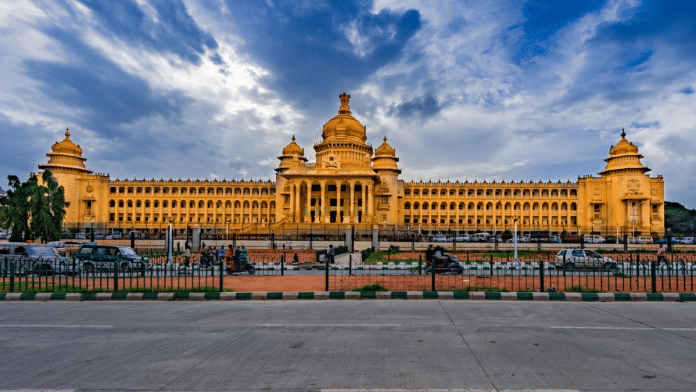Bengaluru: The Karnataka assembly Thursday passed a resolution against the central medical entrance test NEET, thereby joining a growing list of anti-BJP states that have sought exemption from it.
The Mamata Bannerjee-led Trinamool Congress government in West Bengal had passed a similar resolution Wednesday. The assembly also passed a resolution against the proposed “One Nation, One Election” system, and one against the impending delimitation of Lok Sabha constituencies based on the first census after 2026, instead demanding the Union government use population figures from the 1971 census.
NEET or the National Eligibility cum Entrance Test was severely affecting the medical education opportunities of the rural poor, medical education minister Sharan Prakash Patil told the assembly.
The Congress minister, who tabled the resolution, added that the central system was not only making the school education system ineffective, but was also taking away the rights of the state to admit students to government medical colleges.
Patil read out the government’s stand even as members of the Opposition tore up copies of the resolution on NEET.
The state further sought an exemption to grant admission to medical colleges based on scores of the Common Entrance Test or CET. NEET is a single eligibility cum entrance examination across India for MBBS and BDS courses and is currently entangled in growing allegations of irregularities and paper leaks among other issues.
Although it was conceptualised by the Congress-led United Progressive Alliance (UPA) and came into effect in 2010, the competitive exam has undergone many changes since.
Tamil Nadu, Gujarat, Jammu and Kashmir, Andhra Pradesh, Telangana and Uttar Pradesh were among the first states to move the Supreme Court against NEET. But since its introduction in 2016-17, Tamil Nadu and West Bengal have passed resolutions seeking exemptions from it.
Congress wants its own education policy
The Congress stormed to power in Karnataka in the 2023 assembly elections, dislodging the four-year-old Bharatiya Janata Party (BJP) government. As soon as the Congress ironed out its leadership issues, it announced a committee to introduce a state education policy (SEP). It wanted to do away with the Narendra Modi government’s National Education Policy (NEP), which the BJP had introduced in the state two years earlier.
This meant that one section of students who began graduate courses in 2021-22 would fall under NEP and starting 2024-25, batches would come under SEP, leading to non-uniformity in education among students in the same state.
Several states have objected to NEET and NEP as instances of the Centre infringing on their rights.
Also read: Splitting BBMP — how Greater Bengaluru Governance Bill proposes to change city’s governance model
‘NEET is for uniformity’
BJP MLA and former state medical education minister Dr C.N. Ashwath Narayan said the Congress, which introduced NEET, was now opposing it due to purely political reasons.
“NEET is not just an entrance exam… it is an eligibility-cum-entrance exam. There is no limit to their politics. If there are any lapses, challenges… it can be set right. For one mistake, you cannot blame the entire system,” Narayan told ThePrint.
He said NEET was intended to bring in uniformity among students from diverse backgrounds and different regions.
Pradeep Eshwar, a first-time Congress MLA who runs NEET coaching institutes, told reporters Tuesday: “If each state has its own entrance, then students have to write separate exams for each institute and state,”
He added that students would require around Rs 1 lakh just to apply for all competitive institutes and states.
Opposing ‘One Nation, One Election’
Karnataka’s minister for law and parliamentary affairs, H.K. Patil, read out a resolution against the proposal of “One Nation, One Election” as well as one the impending delimitation of Lok Sabha seats based on a future census, which is likely to put the state at a disadvantage.
Patil said that “One Nation, One Election” was a threat to democracy. “Different state assemblies have different tenures and a one-election timetable leads to a focus on national issues and is likely to neglect local issues,” he said.
Opposing the impending delimitation, the Karnataka government said it would lead to injustice as a higher number of constituencies would be focused in northern regions of the country as population continues to swell in these parts.
Further, well-performing states that have managed to keep their populations in check would be “punished” by the reduction of their representation in the lower house of Parliament.
Sharan Prakash Patil told reporters: “They (Union government) don’t want elections. They only want politics. Elections are part of democracy. Why does the central government want to change it? Look how the Government of India is functioning now. It’s dictatorial.”
(Edited by Tikli Basu)
Also read: SC refuses to order NEET-UG retest, says data on record doesn’t indicate ‘systemic leak’







Apart from the merits or demerits of NEET, or some state governments withdrawing general permission granted to the CBI to investigate crimes in their jurisdiction, some CMs staying away from meetings of Niti Aayog, what is most concerning is the gradual unravelling of the federal compact. Another aspect of which is Governors in opposition ruled states getting into confrontations with their democratically elected governments. Cooperative federalism should not remain a cliche. It holds the key to better governance and faster economic growth.